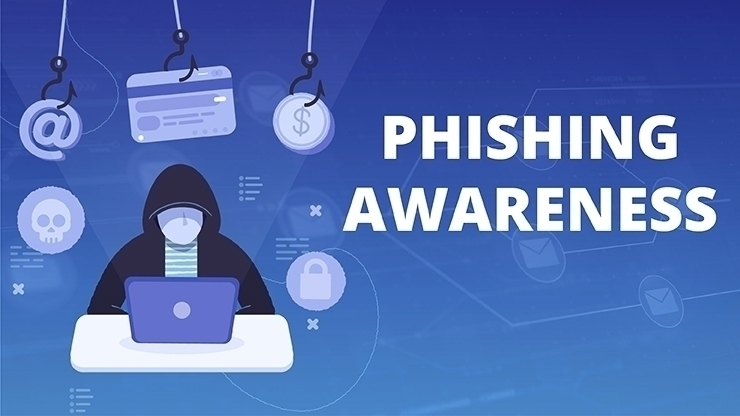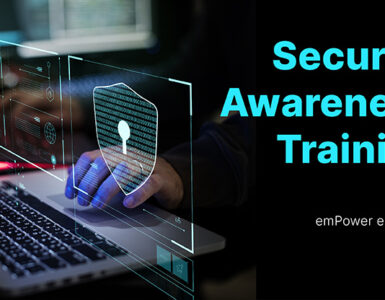1. Introduction
The digital age has brought numerous advantages, including increased connectivity and convenience. However, it has also given rise to various cybersecurity threats. Among them, Phishing remains a significant and common cyber threat that everyone, including healthcare professionals and corporate employees, should be aware of.
2. What is Phishing?
Phishing is a form of cybercrime that uses social engineering techniques to trick individuals into revealing sensitive information, such as usernames, passwords, credit card numbers, or other types of credentials.
The term “phishing” is a play on the word “fishing,” as the process involves cybercriminals throwing out bait (the fraudulent email or message) and hoping that someone takes the bait by providing the requested information. The perpetrator typically poses as a reputable entity or person in electronic communication, such as an email, text message, or phone call, creating a sense of trust or urgency to manipulate the target.
In the context of phishing, social engineering refers to the psychological manipulation that takes place. Rather than using technical hacking techniques, cybercriminals exploit human behavior to deceive the target. They might, for example, pretend to be a bank or a service provider and create a sense of panic by stating there’s a problem with the target’s account, which can only be solved by providing specific information or clicking on a link.
Because phishing relies heavily on manipulating human emotions and trust, it’s considered a form of social engineering. Awareness and understanding of these tactics are crucial for individuals and organizations alike to protect themselves from such threats.
3. Why it’s important for you to follow phishing guidance actively
Actively following phishing guidance is crucial for several reasons:
Personal Information Security: Phishing scams are designed to steal sensitive data such as credit card details, social security numbers, and login credentials. Active vigilance can prevent unauthorized access to your personal information, protecting you from identity theft.
Financial Protection: Phishing attacks often lead to financial fraud. By understanding and applying phishing guidance, you can avoid fraudulent transactions, saving you from financial losses.
Maintaining Privacy: Falling for a phishing attack can lead to privacy breaches, exposing your personal communications, photos, and other private data.
Protecting Professional Information: If you use your devices for work, they likely contain or have access to confidential business information. Following phishing guidance helps ensure the security of this data, thereby maintaining the trust of your employer and clients.
Preventing Malware: Phishing scams can also include harmful software. Clicking on a phishing link can install malware on your device, which can corrupt files, slow down your device, or turn it into a part of a botnet.
Building Safe Online Habits: By following phishing guidance, you develop safe habits that can protect you from other cyber threats as well. This includes being cautious about sharing personal information and double-checking the security of websites.
Educating Others: When you’re knowledgeable about phishing threats, you can educate your colleagues, friends, and family, helping to create a safer digital community.
4. Different Types of Phishing Attacks
Phishing attacks come in various forms, each with its own unique characteristics and threats. Here are some common types of phishing attacks:
Email Phishing: This is the most common type of phishing, where attackers send fraudulent emails appearing to be from reputable sources in order to trick recipients into revealing sensitive information or installing malware on their systems.
Spear Phishing: This is a more targeted form of phishing. In spear phishing, the attacker personalizes their emails to target specific individuals, organizations, or businesses. They often gather and use personal information about their target to increase their chances of success.
Whaling: This is a type of phishing attack that specifically targets senior executives and high-profile targets. The content of a whaling phishing attempt often revolves around executive issues like company-wide decisions or sensitive financial matters.
Smishing (SMS Phishing): This type of phishing attack involves text messages (SMS). The attacker sends a text message with a link to a fraudulent website or a phone number in an attempt to collect sensitive information.
Vishing (Voice Phishing): In this type of attack, the scammer uses a phone call to trick the victim into handing over sensitive information. This can often involve automated voice prompts to make the call appear more legitimate.
Pharming: This form of phishing involves attackers directing users to a fake version of a website, where the user’s information can be stolen. This can be done by exploiting vulnerabilities in DNS server software, or by infecting a user’s computer with malware that redirects them to the fake site.
Clone Phishing: This involves taking a legitimate previously delivered email containing an attachment or link, copying it exactly, but swapping the attachment or link for a malicious one, and then sending it from an email address spoofed to appear like it’s from the original sender.
Business Email Compromise (BEC): These sophisticated scams are targeted at businesses working with foreign suppliers or businesses that regularly perform wire transfer payments. In this attack, the attacker impersonates the business owner or executive to trick the employee into making unauthorized money transfers or revealing sensitive data.
[Also Read: Email Phishing and Security: A Detailed Overview of Types and Techniques]
5. Preventing and Responding to Phishing Attacks
Protecting against phishing scams involves both proactive measures and a keen sense of vigilance. Here are some important steps you can take to protect yourself:
Be Suspicious of Unsolicited Communications: Treat any unsolicited communication with caution, especially if it asks for personal or financial information. Legitimate organizations typically don’t request sensitive information via email.
Check the Email Address: Phishing emails often come from email addresses that resemble genuine company addresses but are slightly altered or misspelled.
Check for Spelling and Grammar: Many phishing emails have spelling or grammatical errors. While legitimate companies can occasionally make mistakes, multiple errors are a warning sign.
Avoid Clicking Links in Emails: If an email asks you to log in to an account, manually type the website’s address into your browser instead of clicking the link.
Verify a Site’s Security: Ensure the site is secure before entering any information. Look for “https://” in the URL – the “s” stands for secure.
Install Anti-Phishing Toolbars: Some browsers offer free anti-phishing toolbars. These toolbars match where you are going with lists of known phishing sites and will alert you.
Keep Your Browser Up to Date: Security patches are released for popular browsers all the time. They are made in response to the security loopholes that phishers and other hackers inevitably discover and exploit.
Use Firewalls: Use a desktop firewall and a network firewall. This combination provides a double layer of defense against phishing attacks.
Be Wary of Pop-Ups: Pop-up windows often masquerade as a legitimate part of a website. Be wary of entering any information into them.
Regularly Check Your Accounts: Regularly check your bank, credit, and debit card statements to ensure that all transactions are legitimate.
Use Two-Factor Authentication (2FA): Always enable 2FA when it’s available. It adds an extra layer of security by requiring additional verification.
Education and Awareness: The best protection against phishing is awareness. Understand what phishing is and stay updated on the latest phishing tactics.
6. Phishing Training
Phishing is a method used by cybercriminals to trick individuals into revealing sensitive information such as usernames, passwords, and credit card details, by disguising themselves as a trustworthy entity in an electronic communication. Training on how to recognize and avoid phishing attempts is crucial to maintaining the security of both personal and professional data.
Here are some key points to include in phishing training:
Understanding Phishing: Explain what phishing is and the common forms it takes (emails, phone calls, text messages). Provide examples of phishing attacks.
Recognizing Phishing Attempts: Teach trainees how to identify common signs of phishing:
- Unsolicited communications requesting sensitive information.
- Poor grammar and spelling, although some phishing attempts may be well written.
- Unusual sender email addresses or URLs that don’t match the alleged sender.
- Threats or urgent deadlines that pressure the recipient to act immediately.
- Generic greetings, such as “Dear customer.”
Check the Source: Emphasize the importance of double-checking the source of any suspicious email, call, or text message. Advise trainees to never click on a link or download an attachment from an unknown source.
Verify URLs: Explain that phishing websites often look identical to real sites. Teach them to check the website’s URL for discrepancies and to ensure it begins with ‘https’ (the ‘s’ indicates it’s a secure site).
Report Phishing Attempts: Explain the importance of reporting phishing attempts to the organization’s IT department or the appropriate authority. Provide them with the necessary contact information.
Regular Updates and Patches: Regularly updating and patching systems can help prevent phishing attacks. Encourage trainees to keep their systems up to date.
Use of Security Software: Encourage the use of firewalls, antivirus software, and email filters. These can help detect and block phishing attacks.
Simulation Exercises: Run mock phishing exercises to help trainees practice what they’ve learned. Review the results and discuss areas for improvement.
Confidentiality: Explain the importance of keeping personal and company information secure. Sensitive information should never be sent over email or given out over the phone.
Continued Education: Cyber threats are constantly evolving, so ongoing phishing education is key. Keep trainees updated on the latest techniques and prevention strategies.
Conclusion
Understanding phishing and its implications is crucial in today’s digital world. It’s essential for businesses, especially in the healthcare and corporate sector, to invest in robust cybersecurity measures. Remember, staying vigilant and proactive is the best defense against cyber threats.
References
For more information, consider visiting the following credible sources:







